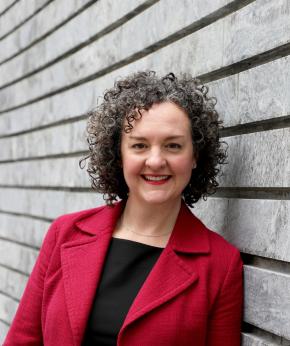Message from the CEO
Our mission is to make the justice system fair, effective, and humane.
This means we put people first.

Courtney Bryan, CEO of the Center for Justice Innovation.
Before we do anything—start a new program, evaluate an existing one, or provide advice to others—we ask: How will this affect people? Will it make lives better? Families stronger? Communities healthier?
We play a unique role as we seek to change systems, particularly the justice system. We are both insiders and outsiders, working collaboratively with government, and engaging advocates and community members to push the justice system in new, positive directions. We’re experts at fostering conversations among people who don’t often see eye to eye—prosecutors and defenders, community members and government actors, those who have been hurt by crime, and those who have committed it. Whether nurturing reforms in New York or advising others around the country and world, we seek diverse voices and take the time to listen. We empower communities to act for themselves. By nurturing relationships, we earn people’s trust.
Putting people first means we are dedicated to seeking justice for historically marginalized groups. In all our work—from providing alternatives to incarceration to supporting communities in the fight against gun violence to helping Family Court improve outcomes for infants—we seek to address underlying needs, repair harm, strengthen neighborhoods, and address racial and gender injustice. All our programs promote positive change for real people.
Putting people first means that we seek to keep as many people as possible from ever reaching the justice system in the first place. To do that, we embrace the fine print, the human scale. We take time to study and focus on the often small, but significant, decisions that have amplified injustice and inequality. Our team of researchers identify what works and what doesn’t, allowing us to share best practices and evidence-based innovations. We complement the work of front-line advocates; while they lobby for change, we figure out what steps are needed to make that change a reality. Reform is sometimes messy, frustrating, and imperfect, but we believe that getting in the weeds is what it takes to achieve fairness, equality, and respect.
Putting people first is also a philosophy we apply here at the Center, among our nearly 800-person team of planners, lawyers, social workers, researchers, violence interrupters, case managers, community engagement coordinators, and other experts. We seek to hire from the communities where we work, and we nurture staff talent with regular in-house training and opportunities to rise through the ranks.
My own story reflects the Center’s commitment to personal growth. Shortly after moving to New York from Georgia, I started in an entry-level job helping our planners develop community courts. Inspired by the work, I went to law school and got a job as a public defender. I valued the Center’s special way of achieving reform, so I returned to work here on our Gender and Family Justice team, to run the Midtown Community Court, and to help expand the Center's criminal justice programming, providing more opportunities to divert people from incarceration. I also coordinated the Center’s behind-the-scenes role in the Independent Commission on New York City Criminal Justice and Incarceration Reform (also known as the Lippman Commission), which successfully argued for closing the jails on Rikers Island. I was honored to spearhead our work on the Commission, which showed the Center at its best: using our assets and expertise—research, operating programs, relationships in communities and institutions—to develop an actionable plan for positive, systemwide change. After leaving the Center again briefly to pursue social change through philanthropy, I leapt at the opportunity to return to serve as the Center’s leader.
We rely on both institutional and individual donors to support our efforts to create a fair, effective, and humane justice system. Please join us and become an active supporter of our work.
Thank you,

Courtney Bryan

